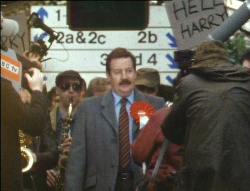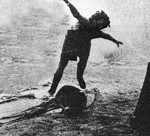by JOHN WHEATCROFT
Writer: Alan Plater; Adapted from Chris Mullin; Director: Mick Jackson

Political drama which carries a left-wing punch can usually expect to find a few dissenters among the majority of journalists – or at least their employers – for whom such views are anathema; it’s easy to review the politics rather than the art. It’s a huge testimony to Alan Plater’s skill as a dramatist that A Very British Coup was received with equal acclaim by commentators from every shade of the political spectrum. Plater believes that the right-wing press can sometimes be more generous than the left, so long as they understand that no attempt is being made to convert them.1

The three-part Channel 4 dramatisation2 of Chris Mullin’s 1982 novel of the same name, A Very British Coup is about the election of a genuinely socialist government, headed by former steel worker Harry Perkins (Ray McAnally). The drama is hardly a call to arms to vote Labour, because, as Plater points out, no government has ever pursued such an agenda.3 However, Perkins proves to be a different kettle of fish, as even his opponents such as Secret Service head Sir Percy Browne (Alan MacNaughton) have to admit, and he will not be deflected. Perkins continues on his socialist path with something as close to total integrity as politics allows. This makes A Very British Coup quite different from many left-leaning dramas, as Mark Lawson remarked: ‘Political drama on television tends to pursue the view that Labour leaders willingly surrender their beliefs in power. A Very British Coup is about something darker, the theft of good intentions.’4

